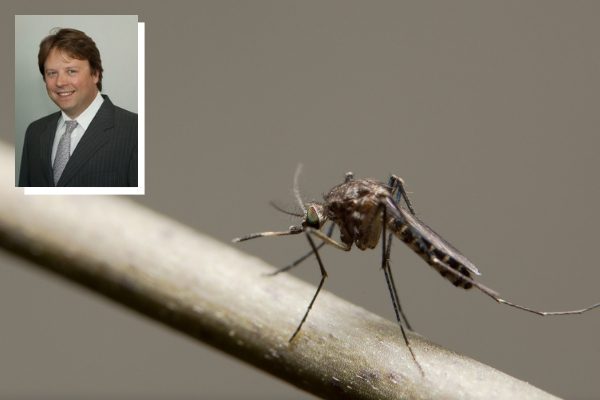Mosquito Season

After a record-setting 2018 continued to deliver higher-than-average rainfall for the first four months of 2019, the stage was set for a mosquito breeding frenzy. And now, Carolinians are bracing for a summer of swatting and scratching.
On May 29th, WBTV Charlotte published the following piece (LINK to story with video) about the bloodsucking pests, featuring CCI’s Dr. Dan Janies:
CHARLOTTE, N.C. (WBTV) – The female mosquito is the one that bites – and she’s looking to get some of your blood so she can digest it and convert it into the energy she needs to make her eggs.
UNC Charlotte Professor Dr. Daniel Janies says he can explain why mosquitoes are especially bad in the Charlotte area.
“We’ve done some research on this and we have an idea that it has to do with the landscape, and heterogenities in landscape, and the closeness between bodies of water and people,” Dr. Janies says. “Right around here, for example, we have the Sugar Creek and so forth and that’s right near big populations of people.”
And having more mosquitoes means more bites.
But, do some people get bit more than others? Dr. Janies says yes.
“Getting bitten by a mosquito or being attractive for mosquitoes has several factors. People say the way you smell, and certain blood types give off a certain attractive smell. Type O apparently. The way you dress. Dark clothing makes it easier when they’re trying to find you. Higher body temperature makes it easier for them to find you. And higher CO2 that you’re breathing out,” Dr. Janies explained.
“Certain people seem to be bitten more frequently. And people are really easy for them to attack because if they’re getting a blood meal off a deer or a bird, they have to find the right spot. But a nice young piece of skin is really easier for them,” Janies said.
So what can you do to prevent mosquitoes?
There’s bug repellant spray and citronella candles. You can also put screens in your windows so mosquitoes don’t get inside.
But, most importantly according to Dr. Janies: “Clean up any standing water. Anything bigger than a bottle cap is enough room for them to breed in.”
Dr. Janis says some of that responsibility also falls on our city and county.
“It’s extremely important. We’ve seen in places where there’s bad infrastructure, potholes, tires, things like that – it’s extremely important for both municipalities and people to clean up their environments as much as possible,” Dr. Janies said. “And that’s – people don’t realize – we used to have malaria and yellow fever in the US and that’s how we cleaned it up.”
Copyright 2019 WBTV. All rights reserved.
For more News, Notes and Updates, Follow CCI on Twitter.